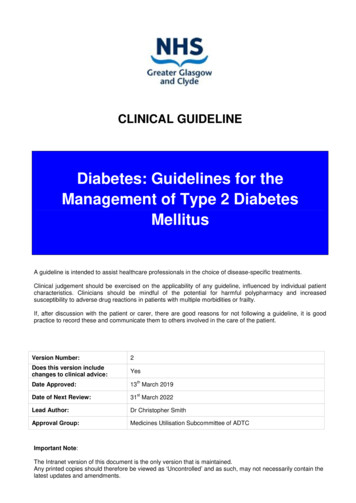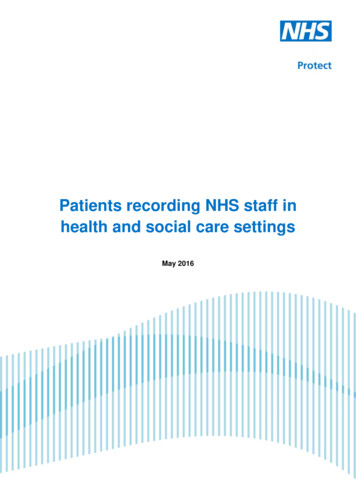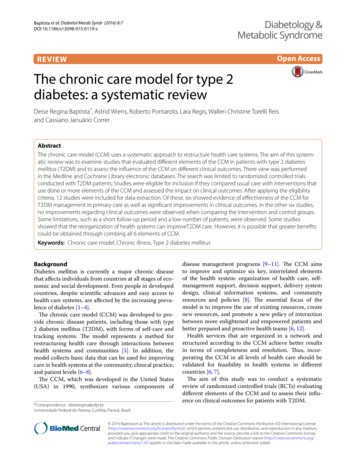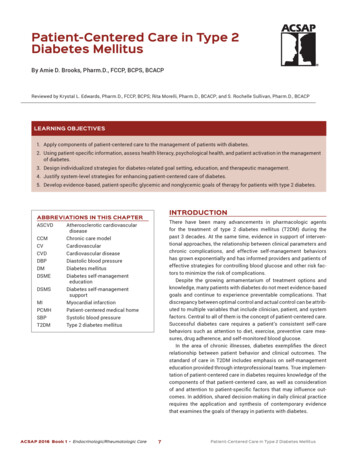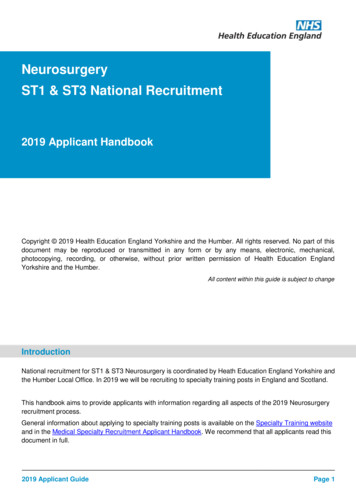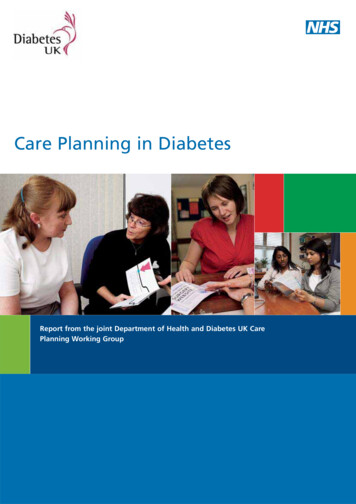
Transcription
Care Planning in DiabetesReport from the joint Department of Health and Diabetes UK CarePlanning Working Group
DH INFORMATION READER atesPerformanceIM & TFinancePartnership WorkingDocument purposeBest Practice GuidanceGateway reference7276TitleCare Planning in Diabetes: Reportfrom the joint Department of Healthand Diabetes UK Care PlanningWorking GroupAuthorDepartment of HealthPublication date04 Dec 2006Target audiencePCT CEs, NHS Trust CEs, SHA CEs,Medical Directors, Directors of PH,Directors of Nursing, Allied HealthProfessionals, GPsCirculation listDescriptionThis report contains guidance on thecare planning process for diabetesservices, building on Standard 3 ofthe Diabetes National ServiceFramework (NSF). It explains theprinciples and processes of careplanning, reviews the evidence base,and offers guidance on putting itinto practice.Cross referenceDiabetes National ServiceFrameworkSuperseded documentsN/AAction requiredN/ATimingN/AContact detailsDiabetes TeamWellington House133-155 Waterloo RoadLondonSE1 8UG020 7972 4656For recipient use
ContentsForeword2Executive summary31Introduction42Policy context63What is care planning?114The evidence base for care planning205Workforce256Putting it into practice287Quality Assurance37Appendix A: Contributors to the Care PlanningWorking Group Report41Appendix B Care planning and the policy context:Further reading44Appendix C Examples of care planning documentation38Appendix D References521
ForewordPeople with diabetes have a crucial role to play in managingtheir condition on a day-to-day basis and care planning, a keycomponent of Standard 3 of the Diabetes National ServiceFramework (NSF), can support them to do this.The NSF Standard 3 sets out a change in traditional practiceand this report will help everyone in diabetes services to movetowards a partnership approach between health professionalsand people with diabetes. It offers guidance on incorporating care planning intodiabetes services and includes examples and signposts to good practice. For the firsttime, the evidence to support care planning in diabetes is brought together in a usefuland practical form and the opportunities for further research are highlighted.These changes will challenge diabetes teams to work in new ways. However, where thisis being tried, there is not only improved patient experience, but staff report greaterjob satisfaction.I would like to thank the members of the joint Department of Health and Diabetes UKCare Planning Working Group for developing the guidance contained in this report. Itwill help diabetes teams to offer a service that encourages partnership in decisionmaking and supports people in managing their diabetes, enabling them to experiencethe best possible quality of life.Rosie Winterton MPMinister of State for Health Services2
Executive SummaryCare planning can be defined as a process which offers people active involvement indeciding, agreeing and owning how their diabetes will be managed. It aims to helppeople with diabetes achieve optimum health through a partnership approach withhealth professionals in order to learn about diabetes, manage it and related conditionsbetter and to cope with it in their daily lives. Care planning is one of the keyinterventions required to achieve Standard 3 of the Diabetes National ServiceFramework: empowering people with diabetes.This report, from the joint Department of Health and Diabetes UK Care PlanningWorking Group, contains guidance on the care planning process for diabetes services. Section 2 sets out the policy context in which care planning for people withdiabetes has been developed. Section 3 describes in detail the principles and processes of care planning andprovides an example of what it might look like in action. Section 4 outlines the evidence base for the model of care planning contained inthis report. Section 5 focuses on workforce issues, outlining the National WorkforceCompetences for Diabetes that are relevant to care planning and which could formthe basis of skills development in this area. Section 6 concentrates on putting care planning into practice. It lays out the keyelements of a care planning process with some suggestions and examples of how itmight be incorporated into diabetes services. Section 7 deals with quality assurance of the care planning process.The report aims to be a useful point of reference for all involved in the care planningprocess.3
Section 1: IntroductionDiabetes is a chronic and progressive disorder that can have an impact upon almostevery aspect of life. It can affect children, young people and adults of all ages, and isbecoming more common. In 2005, it was estimated that 2.35m people in England,4.7% of the population, had diabetes, of which 1.8 million were diagnosed. It ispredicted that, by 2010, 5.05% of the population, or more than 2.5 million people, willhave diabetes. Some sectors of the population are more prone to diabetes than others,with black and minority ethnic groups being particularly adversely affected.iDelivering effective care planning is an integral part of delivering both the DiabetesNSF and the broader agenda for NHS and social care reform. However, the careplanning process is not widely understood and is frequently confused with the conceptof a care plan. In order to develop further guidance on how the care planning processshould work within diabetes services, the joint Department of Health and Diabetes UKCare Planning Working Group for Diabetes was established in July 2005. The remit ofthe group was to: Define care planning Identify criteria for quality and how to assess it Highlight examples of care planning in practice Identify gaps where more work could be done Review the evidence base for care planning Publish a report setting out guidelines for care planning, to be implemented atlocal level.Simon O’Neill, Director of Care and Policy, Diabetes UK, and Dr Sue Roberts, NationalClinical Director for Diabetes, jointly chaired the Working Group. A full list ofcontributors to the report is attached at Appendix A.i4Further information is available from the 2004 Health Survey for England and from the Yorkshire and Humber PublicHealth Observatory Diabetes Key facts document. HSE2004Headlineresults.pdf/file and http://www.yhpho.org.uk/download.aspx?urlid 356&urlt 1. .
IntroductionA policy collaborative has been launched to support the Department of Health in takingforward the commitments made in Our health, our care, our say in respect of a commonassessment framework for adults and integrated personal health and social care plans.iiThis work is expected to define common principles for assessment and care planning foradults with long term care needs. The proposed principles of care planning as set out inthis document will inform the ongoing work of the collaborative and will be reviewed inthe light of the outcomes of the collaborative.iiInformation about the ongoing work of the collaborative is available at www.socialcare.csip.org.uk5
Section 2: Policy contextEngaging patients in their own healthcare and encouraging people to takeresponsibility for protecting their health is widely seen as the best way to ensure thesustainability of health systems in a time of technological progress and increasingdemand1. In a report for the UK Treasury, Wanless2 argued that encouraging effectiveself care, along with measures to promote prevention and the appropriate use ofcommunity care, rather than more expensive secondary care provision, could slow theincrease in spending on health services. Achieving this may however require asignificant change in the way that health professionals in the UK work with patients,according to evidence from comparative surveys conducted around the world3. In thesesurveys only 42% of UK adults said that their regular doctors usually involved them intreatment decisions and only 74% said their doctors gave clear goals and a treatmentplan. Both percentages were less than in the other countries surveyed. The DiabetesInformation Jigsaw Report4 suggests that more could be done to engage people withdiabetes in the UK.The role of care planning to support people with long term conditions is outlined inseveral national policy documents, which highlight the importance of incorporatingcare planning into any local diabetes service.The Diabetes National Service Framework (NSF)The Diabetes NSF was established to drive up service quality and tackle variations incare.iii It sets out twelve standards to be achieved by 2013. Standard 3 of the DiabetesNSF highlights the importance of empowering people with diabetes to take an activerole in managing their condition:“All children, young people and adults with diabetes will receive a service whichencourages partnership in decision-making, supports them in managing theirdiabetes and helps them to adopt and maintain a healthy lifestyle. This will beiii6Department of Health (2001), National Service Framework for Diabetes: Standards.
Policy contextreflected in an agreed and shared care plan in an appropriate format and language.Where appropriate, parents and carers should be fully engaged in the process.”The Diabetes NSF Delivery Strategy further states:“A care plan is at the heart of a partnership approach to care and a central part ofeffective care management. The process of agreeing a care plan offers peopleactive involvement in deciding, agreeing and owning how their diabetes will bemanaged. Whilst the overall goal is a genuine partnership, the person withdiabetes must feel that they are comfortable with what is proposed and that theydo not have to bear more responsibility than they wish”.ivOur health, our care, our say: a new direction forcommunity servicesThe recent white paper, Our health, our care, our say, sets a new direction for thewhole health and social care system.v Services will be designed around the individual,rather than the needs of the person being forced to fit around the service alreadyprovided. The emphasis is on supporting self care, promoting well being andcommunity engagement, as well as prevention and early intervention. There will bemore support for people with long term conditions who will be encouraged tomanage their conditions themselves with the right help from health and social careservices. Steps to help local services develop strategies to support self care for peoplewith long term conditions are set out in Supporting people with long term conditionsto self care: a guide to developing local strategies and good practice.viCare planning is an integral component of delivering support for self care for peoplewith long term conditions. The white paper contains the following commitment:“We will ensure that, ultimately, everyone who requires and wants one will have apersonal health and social care plan as part of an integrated health and social carerecord. Initially we will focus on offering integrated care plans to those individualsivDepartment of Health (2002), National Service Framework for Diabetes: Delivery Strategy.vDepartment of Health (2006), Our health, our care, our say: a new direction for community services.viDepartment of Health (2006), Supporting people with long term conditions to self care: a guide to developing localstrategies and good practice.7
who have complex health and social care needs. By 2008 we would expecteveryone with both long term health and social care needs to have an integratedcare plan if they want one. By 2010 we would expect everyone with a long termcondition to be offered a care plan”.It is through the care planning process that these care plans will be developed. It istherefore vital for local service providers to ensure that care planning is available to allpeople with long term conditions. As stated on page 5, a policy collaborative has nowbeen launched to support the Department of Health in taking forward thecommitments made in Our health, our care, our say in respect of a common assessmentframework for adults and integrated personal health and social care plans.Building on the best: Choice, responsiveness andequity in the NHSPatient choice is designed to support the shift in the NHS to a patient-centred serviceand improve patient experience.vii In addition, increased choice should encourageproviders of services to become more responsive to patients’ needs.The Department of Health wants to extend choice beyond elective hospital care to awider group of patients. The Department is now developing a “Framework for Choice”which will take forward Building on the Best by setting the policy direction andpriorities for increasing choice in other service areas, for example for people with longterm needs.Care planning should be an integral part of the process of providing meaningful choicefor people with diabetes. By ensuring that people with diabetes are informed andengaged in their care, they can take a more active role in making decisions betweenthe different care options that are available.vii8Department of Health (2004), Building on the best: Choice, responsiveness and equity in the NHS.
Policy contextCommissioningCommissioning is seen as the mechanism by which services can be improved and moneyinvested according to local priorities. Every PCT is responsible for commissioning thefull range of health services for its population, working in partnership with practicesand diabetes networks. Commissioning is therefore the main process for deciding whatservices will be delivered and how much will be invested in different service areas. Thisreport aims to provide local commissioners with the information they need in order toimplement high quality care planning for their local populations.The ‘Year of Care’ ProjectA ‘Year of Care’ describes the ongoing care a person with a long term condition shouldexpect to receive in a year, including support for self management,
of a care plan. In order to develop further guidance on how the care planning process should work within diabetes services, the joint Department of Health and Diabetes UK Care Planning Working Group for Diabetes was established in July 2005. The remit of the group was to: Define care planning Identify criteria for quality and how to assess it
